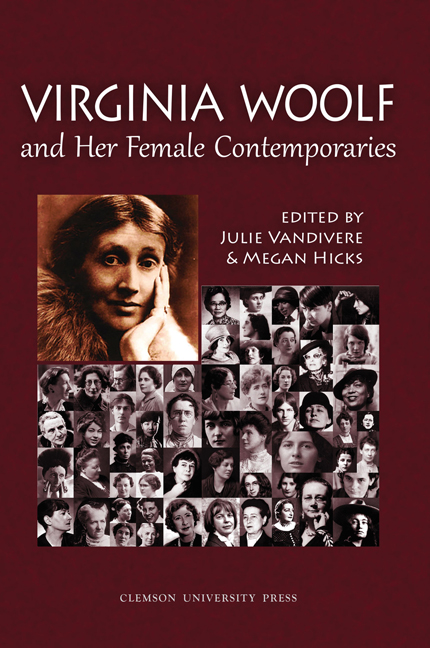Book contents
- Frontmatter
- Table of Contents
- Introduction
- Acknowledgments
- Abbreviations
- Who Are Virginia Woolf's Female Contemporaries?
- Considering Contemporaneity: Woolf and “the Maternal Generation”
- Who Is My Contemporary?: Woolf, Mansfield, and Their Servants
- “The World is My Country”: Emma Goldman among the Avant-Garde
- “Definite, Burly, and Industrious”: Virginia Woolf and Gwen Darwin Raverat
- “A Verbal Life on the Lips of the Living”: Virginia Woolf, Ellen Terry, and the Victorian Contemporary
- Twists of the Lily: Floral Ambivalence in the Work of Virginia Woolf and Georgia O'Keeffe
- Virginia Woolf's Cultural Contexts
- Virginia Woolf's Contemporaries Abroad
- Virginia Woolf's Contemporaries at Home
- Tribute to Jane Marcus
- Notes on Contributors
- Conference Program 223
Who Is My Contemporary?: Woolf, Mansfield, and Their Servants
from Who Are Virginia Woolf's Female Contemporaries?
- Frontmatter
- Table of Contents
- Introduction
- Acknowledgments
- Abbreviations
- Who Are Virginia Woolf's Female Contemporaries?
- Considering Contemporaneity: Woolf and “the Maternal Generation”
- Who Is My Contemporary?: Woolf, Mansfield, and Their Servants
- “The World is My Country”: Emma Goldman among the Avant-Garde
- “Definite, Burly, and Industrious”: Virginia Woolf and Gwen Darwin Raverat
- “A Verbal Life on the Lips of the Living”: Virginia Woolf, Ellen Terry, and the Victorian Contemporary
- Twists of the Lily: Floral Ambivalence in the Work of Virginia Woolf and Georgia O'Keeffe
- Virginia Woolf's Cultural Contexts
- Virginia Woolf's Contemporaries Abroad
- Virginia Woolf's Contemporaries at Home
- Tribute to Jane Marcus
- Notes on Contributors
- Conference Program 223
Summary
I begin with an excerpt from one of Katherine Mansfield's December 1920 letters from Menton, France:
I am still hard at the story writing and still feeling that only now do I begin to see what I want to do. Im sending you my book. Its not a good one. I promise the next will be better…Living solitary these last months with a servant who is a born artist… who returns from market with a basket which just to see on the kitchen table is food for the day—makes work a great deal easier to get at. The strain is removed. At last one doesn't worry any more. And fancy ones domestique having an idea of what work is! She won't even let a person talk at the front door if Im working. She whispers to them to go to la porte de la cuisine… parce que c'est tres enervant pour Madame d'entendre causer quelqu'un pendent elle travaille! Its like being in Heaven with an ange gardienne. (Letters 4:152–53)
What's so striking about this passage is how directly Mansfield states her dependence as a writer on her servant's domestic work, which ranges from shopping for food to protecting the threshold from intrusive entrances and even from potentially irritating talk. Mansfield's deprecatory assessment of Bliss and Other Stories slides immediately into this brief but illuminating sketch that illustrates the circumstances that will, Mansfield insists, ensure that “the next will be better”: her writing is directly fostered, supported, witnessed, and appreciated in the labors of Marie, herself a “born artist.”
Marie, too, should be considered one of the female contemporaries on whose work this conference focuses. The domestic servants whose housekeeping work enabled writers like Mansfield and Virginia Woolf to concentrate on literary works are also crucial contributors to the development of literary modernism. They are not just living and working at the same time as Mansfield, Woolf, Gertrude Stein, Rebecca West, and many others, but in many cases are living and working in the same physical place. But while Woolf 's complicated relationships with servants throughout her life—and the impact of those relationships on her work as a writer—are beginning to be more fully chronicled, the same cannot be said for other female modernists, even when passages like this one from Mansfield's letters point out how intertwined are writing and housekeeping.
- Type
- Chapter
- Information
- Virginia Woolf and Her Female Contemporaries , pp. 8 - 14Publisher: Liverpool University PressPrint publication year: 2016



